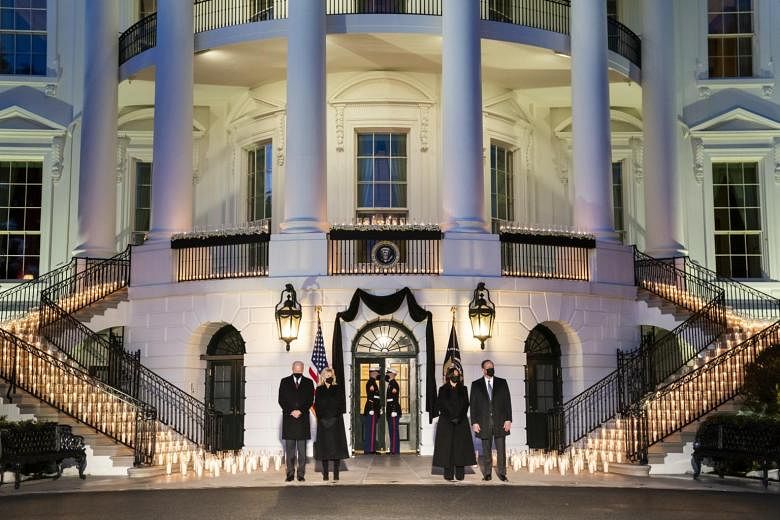WASHINGTON - Flags were lowered to half-mast on Monday (Feb 23) to mourn the half a million people who died due to Covid-19 in the United States, a stunning death toll higher than any other country in the world.
"Today we mark a truly grim, heartbreaking milestone. 500,071 dead. That's more Americans who've died in one year in this pandemic, than in World War I, World War II and the Vietnam War combined," said President Joe Biden at a remembrance ceremony.
"The people we lost were extraordinary. They spanned generations. Born in America, immigrated to America. But just like that, so many of them took their final breath alone in America. As a nation, we can't accept such a cruel fate," he said in a sombre speech at sunset, before lighting candles at the White House and observing a moment of silence.
America has 20 per cent of all reported Covid-19 deaths in the world, even though it makes up just 4.25 per cent of the global population.
Monday's grim milestone underscored the magnitude of the challenge that America still faces in defeating the pandemic, even as the numbers of infections, hospitalisations and deaths have been dropping for weeks following a November surge.
The trends are promising. The current seven-day average of 66,000 cases per day is 74 per cent lower than the peak seven-day average on Jan 11, capping five weeks of steady decline. This level is similar to last summer's peak, US Centers for Disease Control and Prevention (CDC) director Rochelle Walensky said at a briefing on Monday.
The seven-day average for new hospital admissions of 6,500 a day was a 60 per cent decline since the peak on Jan 9, and the lowest since last fall, she added.
The number of reported deaths also continues to decline, and is now the lowest since the start of December. The seven-day average stands at 1,900 deaths, 39 per cent down from the previous week, said Dr Walensky.
Former CDC chief Tom Frieden, who now heads the global public health organisation Resolve to Save Lives, said: "Covid decreases are steep, sustained, and nationwide. Cases decrease first, then hospitalisations, then deaths."
He gave four major reasons for the decrease: less travel, less mixing of people indoors, more consistent mask wearing, and growing immunity from infections and vaccination. About 12 per cent of America's population has received at least one dose of the Covid-19 vaccine.
"Better does not mean good, and safer does not mean safe," Dr Frieden wrote on his weekly blog. "Although the situation is much improved over the past month, we're still not where we were at the end of summer."
Dr Walensky added: "While the pandemic is heading in the right direction, there is still much work to do."
President Joe Biden, who has now been at the helm of the country for over a month, has rolled out mask mandates, acted to boost the supply of vaccine doses, and encouraged Americans to get vaccinated.
On his second day in office, Mr Biden ordered that masks be required in airports, planes, buses and trains as well as on federal property, in stark contrast to his predecessor Donald Trump, who never supported such a mandate and did not consistently wear one himself.
Alluding to Mr Trump's skepticism, Mr Biden said: "We must end the politics and misinformation that has divided families, communities, and the country, and has cost too many lives already."
"It's not Democrats and Republicans who are dying from the virus. It's our fellow Americans," he added.
The President's chief medical adviser Anthony Fauci, who also served under Mr Trump, said in an interview with Reuters that political differences and "intense divisiveness in society" contributed to the stunning death toll, as well as mixed signals from the White House.
Mr Biden has also ramped up the vaccine rollout. Last Tuesday (Feb 16), the White House announced that states will begin receiving 13.5 million doses per week, up from the 8.6 million doses they were getting weekly when he first took office.
The Biden administration also said earlier this month that it had secured an additional 200 million vaccine doses by July from drugmakers Pfizer and Moderna, bringing the total to 600 million, which is enough to vaccinate America's population of 300 million.
While some of these purchases could have been under contracts negotiated by the Trump administration, the Biden administration has slammed its predecessor for not ordering enough vaccines, not planning for enough people to administer the vaccines, and not arranging enough vaccination sites.
Reuters reported on Tuesday that Pfizer expects to ship 13 million doses of its vaccine per week to the US by mid-March, more than double what it was shipping in early February.
While the recent decreases in Covid-19 cases are promising, a lot depends on whether Americans continue to wear masks and socially distance, particularly with the spread of Covid-19 variants, said experts. Mr Biden urged Americans to remain vigilant, stay socially distanced, wear masks, and get vaccinated.
"Let this not be a story of how far we fell, but of how far we climbed back up. We can do this," he said.












